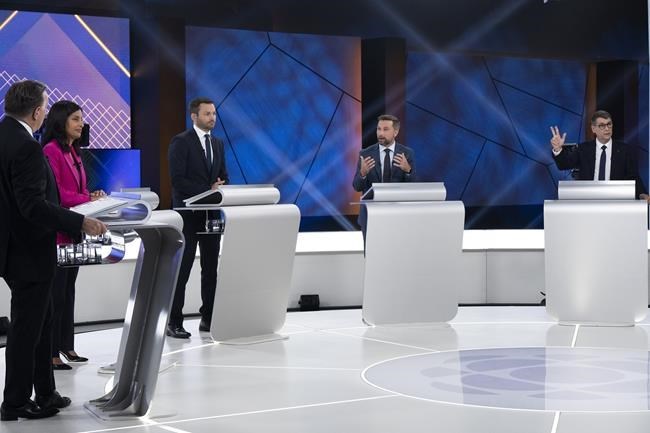MONTREAL — Coalition Avenir Québec Leader François Legault faced a four-way attack on the environment, the cost of living and the decline of French in Thursday's leaders debate, but he seemed to focus his counterattacks on one opponent: Québec solidaire's Gabriel Nadeau-Dubois.
Four major parties are locked in a fight for second place, trailing far behind the incumbent CAQ in the polls, and Legault on several occasions zeroed in on the left-wing party seeking to replace the Liberals as the official Opposition.
In one exchange, the premier said Nadeau-Dubois' plans to combat climate change — which include high taxes on certain types of cars and billions of borrowed dollars for public transport projects — aren't realistic.
"I get the impression that it's kind of like magic, kind of as if you are in wonderland," Legault said.
Nadeau-Dubois shot back: "Stop scaring people; you should be inspiring Quebecers, proposing solutions."
Quebec aims to reduce its greenhouse gas emissions by 37.5 per cent by 2030 compared to 1990 levels, but the province missed its 20 per cent reduction target set for 2020 and instead reached just six per cent.
Legault has said reaching the 2030 targets isn't possible without a new hydroelectric dam, and he has suggested the four other parties' plans aren't achievable. The Liberal Party of Quebec, meanwhile, is proposing a 45 per cent reduction target over that same period; Québec solidaire is aiming for 55 per cent.
During the section on cost of living, Legault once again took aim at Nadeau-Dubois, bringing up comments the Québec solidaire spokesman made about “decreasing the growth” of certain sectors of the economy.
“Which sectors are you talking about?” Legault asked.
Nadeau-Dubois didn’t directly address the question but talked about how demand will soon decrease for fossil fuels, which he said would affect companies such as oil refineries.
Legault cut him off, “and what about the manufacturing industry?” The premier suggested Québec solidaire's ideas would shutter companies, impoverish Quebecers and massively increase the province's debt.
Nadeau-Dubois replied — with a line he used more than once on Thursday — that Legault was using fear to make arguments: “Stop taking out the Halloween decorations and scaring people.”
A segment on the French language saw Legault criticize a proposal by Parti Québécois Leader Paul St-Pierre Plamondon to bar francophones and non-anglophones from going to English-language junior colleges.
"The key (to preserving French) is the integration of new Canadians, not prohibiting … francophones from perfecting their English in an English (junior college)," Legault said.
The PQ leader, in return, deemed the CAQ's language law reforms — known as Bill 96 — as a "half-measure" contributing to the decline of French in the province. St-Pierre Plamondon was referring to a recent Statistics Canada report that said the percentage of Quebec residents who predominantly speak French at home declined to 77.5 per cent in 2021 from 79 per cent in 2016.
"Never in four years have we seen such a significant decline of the French language than under your leadership, Mr. Legault, and you bear that responsibility," St-Pierre Plamondon charged.
The debate on language often overlapped with that on immigration, and Liberal Leader Dominique Anglade accused the premier of being needlessly divisive on both issues.
"When Mr. Legault talks about our capacity to integrate, I don't know what he bases it on," she said, noting the province this year has welcomed 70,000 immigrants. While there is a need for immigrants to integrate linguistically, "we can do that without dividing Quebecers," she said.
Legault has said he wants to cap immigration at 50,000, while the Liberals and Québec solidaire are proposing to raise the cap to 70,000 and up to 80,000, respectively. The PQ, meanwhile, wants to bring it down to 35,000.
While Legault's attacks were most frequently directed at Nadeau-Dubois, the premier focused on Conservative Party of Quebec Leader Éric Duhaime regarding mental health. The premier said Duhaime, whose party has gained support through its opposition to COVID-19 measures, was irresponsible.
“Because over the past two years, Mr. Duhaime has played the role of agitator who has profited from the suffering of people in Quebec," Legault said, regarding Duhaime's constant criticism of the government's handling of the pandemic.
"He thinks that it’s not true that there were fewer deaths in Quebec; frankly it's irresponsible."
Duhaime accused Legault of being unable to admit that Quebec has a mental health problem related to the strict COVID-19 rules, which included a five-month curfew — the only such measure imposed in the country during the pandemic.
Legault asked if Duhaime would have been willing to sacrifice twice as many seniors by imposing fewer rules.
Duhaime replied, "You were irresponsible with the children of Quebec, Mr. Legault, never forget that."
On the issue of tax cuts, the CAQ, Liberals and Conservatives all want to reduce them, while Québec solidaire and the Parti Québécois do not. St-Pierre Plamondon warned that the tax cut plans of the other parties could lead to austerity if there's another recession.
"It's a one-way trip toward austerity," said St-Pierre Plamondon, whose party is promising refundable tax credits.
The French-language debate, hosted by Radio-Canada, was the final faceoff between party leaders before the Oct. 3 vote. Unlike in 2018, there is no English-language debate in this election campaign.
This report by The Canadian Press was first published Sept. 22, 2022.
Paola Loriggio and Jacob Serebrin, The Canadian Press




